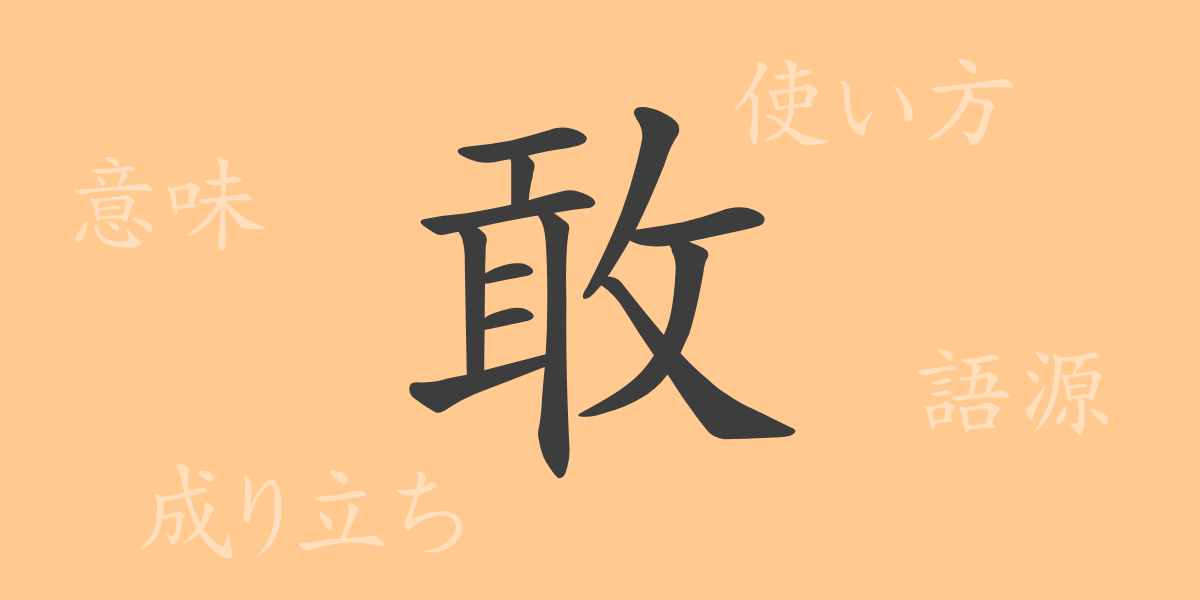Kanji, with their varied shapes and sounds, enrich the Japanese language by conveying a multitude of meanings. Among them, the kanji “敢” ( Kan) symbolizes courage and determination, and is frequently used in our everyday lives as well as in business contexts. This article delves into the allure of “敢,” exploring its origins, meanings, usages, and its presence in various idioms and proverbs.
The Origins (Etymology) of 敢
The kanji “敢” (Kan) has evolved from ancient Chinese pictographs. Originally, it represented the meaning of “to dare to do something,” with its shape depicting the act of gripping something firmly with the hand. As time passed, its form changed, leading to the current “敢,” yet its fundamental connotation of courage and the spirit of challenge has remained unchanged since ancient times.
The Meaning and Usage of 敢
The primary meanings of “敢” (Kan) are “to be brave” and “to act decisively.” This kanji is used to express the inner courage of a person or proactive actions taken outwardly. For example, “敢行” ( Kankou) means “to carry out decisively,” and is used when executing plans or actions with courage. Additionally, “敢然” (Kanzen) is an adjectival verb used to describe a state of being bold or valiant.
Readings, Stroke Count, and Radical of 敢
The kanji “敢” (Kan) has specific information regarding its readings, stroke count, and radical.
- Readings: The on’yomi (Sino-Japanese reading) is “かん” (Kan), while the kun’yomi (native Japanese readings) are “あえて” (A-ete), “あえない” (A-enai).
- Stroke Count: “敢” (Kan) is composed of a total of 12 strokes.
- Radical: The radical of this kanji is “攴” ( Bokuzukuri).
Idioms, Phrases, and Proverbs Using 敢 and Their Meanings
There are many idioms, phrases, and proverbs that include “敢” (Kan), each imbued with deep meaning.
For instance, “敢闘精神” ( Kantouseishin) represents the spirit of continually challenging oneself with courage. “敢然として” (Kanzen- to shite) conveys a bold and fearless demeanor. Moreover, “敢えて” ( A-ete) is used in the sense of “deliberately” or “daringly,” as in “敢えて反論する” (A-ete- hanron- suru), meaning “to object on purpose.”
In proverbs, there is “敢えて行かぬは勇ならず” ( A-ete- i-kanu wa -isama-narazu), which teaches that “Not facing danger on purpose is not true courage.” Through these expressions, we can see how deeply the meanings of courage and challenge associated with “敢” (Kan) are ingrained in the Japanese language.
Summary of 敢
The kanji “敢” (Kan) has continued to live in our language as a symbol of bravery and resolute action since ancient times. The powerful meaning carried by this single character inspires courage in our hearts and encourages a will to challenge, through idioms and proverbs. In both everyday life and business scenes, the spirit of “敢” (Kan) influences many people, becoming an essential value for moving forward.

























